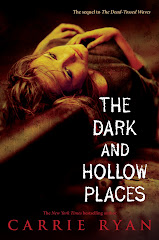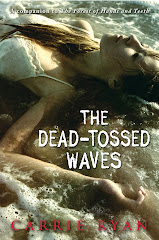In fact, it wasn't until recently that I allowed myself to start putting books down and not finishing them if they didn't hold my interest. At first I would merely set a book aside and start a new one, promising to come back to the old. But rarely, if ever, have I gone back to the old. Sometimes it isn't even that the old book didn't hold my interest but that something bigger caught my eye or I was just in the mood for something else.
Part of the problem I have with going back to those books is that I have a terrible memory and I've lost the thread by now. I'm always afraid that I'll never enjoy a book well enough if I don't read it straight through (there are some books I would pick back up and I didn't even know the characters' names anymore!). I hate the idea of missing something - a plot point, a joke, a reference - because I can't remember the first part of the book I read so long ago (and for me long ago can even be a couple of weeks!).
This year it seems I'm putting more and more down. Maybe it's because I'm a prime member of Amazon and so I buy books on a whim. No more making lists or browsing at bookstores where I feel way too indulgent and gluttonous standing in line with armloads of books. But with Amazon it's easy - two books here, three there, another one or two for good measure - and suddenly my side of the bed is awash in a to be read pile (when I cleaned a few weeks ago I pulled 21 books off the floor next to my bed).
It makes me sad to have these un-finished books laying around. Sad for me because I am always sure I'm missing a great read (even if I know I didn't enjoy reading the part I did get to). Sad for the author because they put so much of themselves into each book and I set it aside so casually (though, at least I bought it!).
Recently I've tried to be more conscious of what I'm putting down and why. One NYT bestseller (that my entire family devoured) I put down because I just hated the attitude of one of the characters and felt it was totally unrealistic. Plus, it had tons of those "you know Bob, remember when we plotted world domination? Let's go over that plot again..." or whatever you call it when characters have totally unrealistic conversations so the reader can catch up. Another I put down because the opening dragged on. Cute first scene but I wanted to say "enough already! So you walked in on something icky! Get over it... you're 10 pages into the story so get to the story already!" That one was a real killer cause I love this author and think the book has such a cute premise and I've really been anticipating the book. I might try again with it though since I didn't get that far in....
Another had a sagging middle and wasn't developing the way I'd anticipated (not that this is a bad thing, but I don't like it when I see all these awesome possibilities with a premise the author goes the booooring route). Another was highly recommended and if I'd given it more time I'm sure I would have adored it, but it was too slow opening. Another (NYT bestselling author) had truly terrible telling writing. Appalled I was! I almost put down a suspense book with 10 pages left to go. The whole book had been great and pounding and then the characters ended up in a cabin in the woods hanging out and I was like "huh? where's the pacing? Um, you're still in danger, guys." Turns out the pacing was there, once I got through a couple of slower pages. But I almost didn't bother (which astounds me - I'm usually never THAT bad!)
So, while I've found it hard and sad to set these books aside, at the very least I've been trying to learn from them. To figure out the why's of it so that I can try not to make those same mistakes in my own writing. And I feel like I've learned some great tips:
- Once you've made a point, move on. Don't belabor, don't get mired down in dialoge that doesn't move the story forward. Especially in the beginning.
- When you've got a hook and when you sell the book to the reader based on that hook, get to the hook early. Don't make us sit around and wait; that can make the reader antsy.
- Corollary to above: if the reader knows the hook is coming don't make like it's some big surprise to the reader. And don't make that the only thing we're reading for either. If we know the book is about the woman getting dumped by her boyfriend and so she has to go out and figure out her life (or whatever) don't drag out the first two chapters when she's all nervous cause she thinks he's going to propose to her at the special dinner he planned when we all know she's about to be dumped cause that's what the book is about. Sure, make it a cute scene, but don't spend too long.* We already know what happens (this is my personal back cover blurb rule: if the reader will know something by reading the back cover blurb, don't drag it out in the book - or at least don't make that be the only reason the reader is turning pages cause there will be no payoff).
- Be creative with the middle of the book (so much easier said than done, eh?) Don't necessarily go with the first idea that strikes you. I can't remember who said to brainstorm 20 options for each big plot point because you never know what kind of crazy, yet appropriate, stuff you'll come up with. I guess I'm trying to say that sometimes the obvious is good, but sometimes it's boring. I think this is more important for plot based books: I like less obvious for plot based books. If it's character based I don't mind so much if the plot is obvious because I care more about the characters and how the plot is a reflection of them.
- Make every scene count. Don't give the reader the option of putting the book down. So much easier said than done, eh?
There are just too many great books out there, more and more of them written by my friends that I feel compelled to support and read.
How do y'all feel about putting books down? Do you feel like you learn anything in doing so?
______
* I think a perfect example of this is Diana Peterfreund's Secret Society Girl. The whole book is about the main character getting tapped into the elite, previously all male secret society. We know this from the blurb. Of course Diana can't just have that be the very first page (actually, I'm sure she could have, but she chose not to). Instead, the character thinks she's being tapped for another society. If this was all the first few chapters were about I would have been chomping at the bit. I'd have wanted to hit Amy over the head and say "yo, figure it out!" Instead Diana made these scenes pull double and triple duty - introducing us to Amy: her world, her goals, her reality - really letting us get to know Amy so that we understand what it means when she finally figures out what's up. So those first chapters aren't just us wondering what society Amy's been tapped into, it's about Amy's life as a whole. In the same way the book isn't only about the society, but choices that Amy has to make about her life. As readers, we weren't just sitting around waiting for Amy to figure out what we already knew.
















3 comments:
This is a really good post. There are some things here that need to be said, and should be said, and should continue being said. I've only just started letting myself put down books as well (though I'm willing to bet money that I've started younger than you...is that a good thing or not?), apart from that one in third grade that I felt really guilty about leaving...anyway.
As a writer, it's so important to know what makes you loose interest enough to stop reading...thank you for putting it all into words, with such good advice along with it!
I hope you're working relentlessly toward the goals you outlined in your last post. Goals are nice things to reach and I really hope you do.
Thanks again!
Miri
This is a fantastic post, and I read it very carefully. But I have to admit it set me in a bit of a panic. I'm positive I've done at least half a dozen of these things in my debut novel, and it's way too late to take them back now.
I worry about this a lot. I'm always thinking of something I should have changed, or something I could have done better. But now I just have to let it go, right?
It'll be okay if not everyone loves it, right? Right?
Maybe not...
Great post! Very insightful. I've been thinking about those '20 things' to consider as plot-points lately, and I wonder if I'm choosing the right ones.
I have to admit, I've been putting more books down lately too, and my TBR pile is also huge. Bet the phenomena are related...
Post a Comment